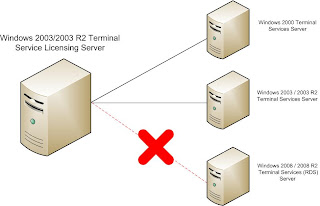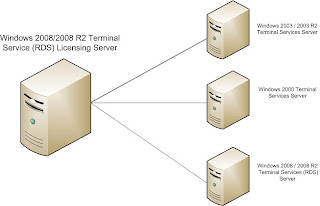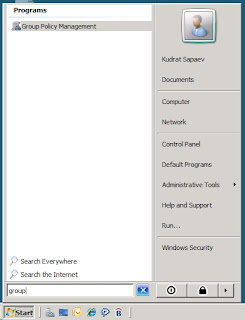Hi,
Today I want to share with you some “easy to understand” pictures about Terminal Services Licensing. In particular I will show you which version of Terminal Services Licensing Server can issue licenses to which version of Terminal Services Server.
Terminal Services Licensing Server based on Windows Server 2003/2003 R2 operating systems.

As you can see on the picture, this server can issue licenses to the Terminal Services Server based on Windows Server 2000/2003/2003R2 operating systems. But it cannot hold and issue licenses for the Terminal Services (RDS) Servers based on Windows Server 2008/2008R2.
For example you have a Terminal Services Server based on Windows Server 2003/2003R2 and you are planning to upgrade it to Windows Server 2008/2008R2. In this case you will have to upgrade your Terminal Services Licensing Server from Windows Server 2003/2003R2 to Windows Server 2008/2008R2 and you will also have to upgrade your TS CALs (Terminal Services Client Access Licenses) from 2003 to 2008.
Terminal Services (RDS) Licensing Server based on Windows Server 2008/2008 R2 operating systems.

On this picture we can see that Terminal Services (RDS) Licensing Server based on Windows 2008/2008 R2 operating system can hold and issue licenses to the Terminal Services (RDS) Servers running on Windows Server 2000/2003/2003R2/2008/2008R2 operating systems. It is quite straightforward, younger operating systems support the older ones.
I would like to draw your attention to one point as sometimes it confuses some people. Terminal Services (RDS) Licensing Server based on Windows Server 2008 can issue licenses to the Terminal Services (RDS) Server running on Windows Server 2008R2, and vice-versa Terminal Services Licensing (RDS) Server based on Windows Server 2008R2 operating system can issue licenses to the Terminal Services (RDS) Server running on Windows Server 2008.
That is it, I hope it gave you a clear idea about interaction between TS licensing Servers and TS Services Servers.





